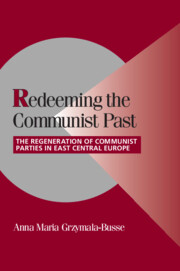Book contents
- Frontmatter
- Contents
- List of Tables
- List of Acronyms
- Acknowledgments
- INTRODUCTION: SURVIVING DEMOCRACY
- 1 THE ROOTS OF REGENERATION: COMMUNIST PRACTICES AND ELITE RESOURCES
- 2 BREAKING WITH THE PAST, REORGANIZING FOR THE FUTURE
- 3 DEVELOPING PROGRAMMATIC RESPONSIVENESS
- 4 CONVINCING THE VOTERS: CAMPAIGNS AND ELECTIONS
- 5 PARLIAMENTARY EFFECTIVENESS AND COALITIONS
- CONCLUSION: SUCCEEDING IN DEMOCRACY
- APPENDIX A THE CONTENT ANALYSIS OF PROGRAMS
- APPENDIX B THE QUANTITATIVE ANALYSIS OF ELECTORATES
- APPENDIX C THE STRUCTURES OF COMPETITION
- Bibliography
- Index
- Titles in the series
CONCLUSION: SUCCEEDING IN DEMOCRACY
Published online by Cambridge University Press: 04 December 2009
- Frontmatter
- Contents
- List of Tables
- List of Acronyms
- Acknowledgments
- INTRODUCTION: SURVIVING DEMOCRACY
- 1 THE ROOTS OF REGENERATION: COMMUNIST PRACTICES AND ELITE RESOURCES
- 2 BREAKING WITH THE PAST, REORGANIZING FOR THE FUTURE
- 3 DEVELOPING PROGRAMMATIC RESPONSIVENESS
- 4 CONVINCING THE VOTERS: CAMPAIGNS AND ELECTIONS
- 5 PARLIAMENTARY EFFECTIVENESS AND COALITIONS
- CONCLUSION: SUCCEEDING IN DEMOCRACY
- APPENDIX A THE CONTENT ANALYSIS OF PROGRAMS
- APPENDIX B THE QUANTITATIVE ANALYSIS OF ELECTORATES
- APPENDIX C THE STRUCTURES OF COMPETITION
- Bibliography
- Index
- Titles in the series
Summary
Few political actors have faced a more difficult task of reinventing and transforming themselves than the communist successor parties of East Central Europe after 1989. Yet, as we have seen, several of these disgraced ancien regime parties survived and succeeded in the new democratic system. Paradoxically, the reasons lie in the parties' discredited past: The same practices that made the parties' rule so inadequate during the communist era could become their salvation during the democratic transition and beyond.
These parties thus “redeemed the communist past” both by making amends for the most disgraceful elements of their history and by cashing in on their elite resources to remake themselves into successful democratic competitors and governors. In so doing, they confirmed the expectations presented at the outset of this study: The political resources at their disposal were directly rooted in the communist era, and these assets then influenced the parties' response to the challenges and difficulties of democratic politicking and transition politics. Thus, external policies of advancement within the communist party promoted elite pragmatism and technical know-how, experience with policy innovation led elites to realize the need for party transformation and centralization, while policy implementation and negotiation with the opposition promoted the formulation of responsive programs, new dimensions of competition, and effective electoral campaigns.
These portable skills and usable pasts determined whether the parties could embark on strategies of organizational transformation. These were of paramount importance for the public resurrection of discredited parties that were forced to exit from power.
- Type
- Chapter
- Information
- Redeeming the Communist PastThe Regeneration of Communist Parties in East Central Europe, pp. 265 - 284Publisher: Cambridge University PressPrint publication year: 2002



